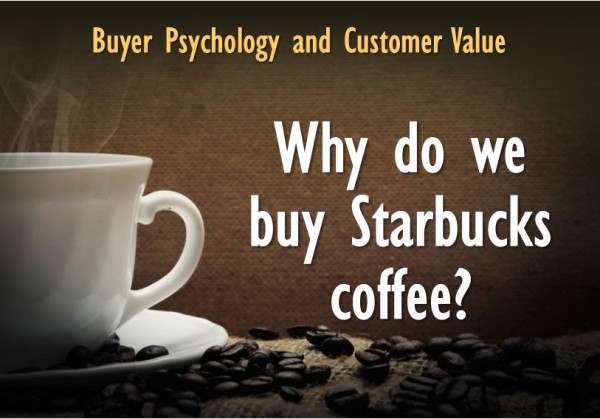Hint: it is probably not because of the quality of the coffee.
This post was inspired by a question on Quora that asked whether Starbucks coffee is truly better and how the company makes it addictive. What I found fascinating about this question is that the quality of the coffee isn’t the main factor. There are other psychological and emotional reasons behind Starbucks’ global success.
After all, contrary to what most people believe, we all make purchase decisions emotionally and then (sometimes) justify them rationally. This is true in B2B and B2C, it is true for $1 or for $1 Billion purchases. And it is critical for all marketers to understand.
Is Starbucks Coffee of Better Quality?
When Starbucks launched, there were not very many places in the US where you could get espresso-based coffee like Lattes or Cappuccinos. this was a big part of Starbucks’ novelty.
Starbucks takes pride in its own roast, which is darker than what most coffee shops offer—somewhere between a regular roast and a French (espresso) roast. This process brings out more oils from the bean, leading to caramelization and a slightly more bitter taste. Recently, Starbucks began selling its blond roast, which provides a more classic flavor.
Given the company size, it would be difficult to maintain top quality, even if they tried. In general, most people who know about coffee would agree Starbucks is never as good as fresh roasted premium coffee you can get at many small coffee shops. One exception is the coffee you can find at certain Starbucks locations that use the Clover brewing machine, which is quite good.
Blind taste tests have shown the average American prefers Dunkin Donuts or McDonald’s coffee to Starbucks coffee.
So why are so many people addicted to Starbucks? There is nothing extraordinary in their coffee beans, and no special coffee or extra ingredients that that produce addition aside from caffeine. Their success, and customers’ addiction with the brand does not come from the coffee…
Coffee Experience is more Important than Actual Coffee Quality.
Three main factors contribute:
1. Coffee Buying Experience. Howard Shultz (Starbucks Founder) spent a lot of effort not only in the beverage itself but in the entire coffee buying experience.
This is why Starbucks locations around the world consistently have a good atmosphere, indirect lighting, relaxing music in the background, great aromas, and friendly ‘baristas‘.
This is also why their coffee has unique names. At Starbucks you don’t order a simple black coffee, you order a Pike Place blend venti. Rites, names and processes are important part of customer experience.
2. Personal Reward . Psychologists believe a big part of Starbucks’ success comes from the desire to reward yourself. Before a long day of work, you deserve to treat yourself to a nice Grande Cappucino. It’s a little daily splurge that most people can afford.
Behavioral psychologist Dan Ariely has proven how our brain tricks us into enjoying things more if we believe they are better. This means that even if the coffee at Starbucks is not actually scientifically better than the average coffee, the combination of the brand, the experience and your belief that it is probably better makes your brain actually taste it as better coffee and enjoy it more than an average coffee. This is why blind tests are important, because your taste buds will go with your brain bias.
In other words, perception is reality.
3. Familiarity – When you are running to work, and you need your morning Joe, it is hard to think about multiple coffee shops, evaluate them and decide on one. The default answer to ‘morning coffee’ is ‘Starbucks’. This is the power of branding and positioning.
When you are in a different city, going to Starbucks is lower risk: you know the coffee is OK (at least, or at least you think that), you know what to expect, you know they probably also have pastries and other items you may be looking for. It is a decision with lower risk than going to an unknown place that may or may not have good coffee.
So no, Starbucks does not have better coffee, but it will taste better for you if you believe it. I drive an extra 5 minutes to get to the best coffee I can find, but I am as susceptible to my brain driving and my emotions driving my buying decisions as anyone else.
Commodities and Differentiation
Before Starbucks, Coffee was a commodity. Most restaurants or diners would sell a cup for about a buck. It was a commodity. Coffee was just coffee. After all, coffee beans are traded in commodities markets around the world with fairly standard pricing.
And yet, Starbucks charges $2, #3 up to $6 for a cup of coffee that has the same basic commodity ingredients. The genius of Howard Shultz was looking at emotions and experience to create value for customers.
A commodities market is one where marketers have run out of ideas to create value for customers.
The most important lesson is that marketing, brands and experiences create real value for customers beyond the intrinsic value of the product. Marketing should be the value engine of your company.
CMOs and Marketing Leaders should ask themselves: Do I understand how my products make your customer feel? Have I explored all the emotional and experiental ways to create differentiated value around our products and services?
Enjoy your next cup!
